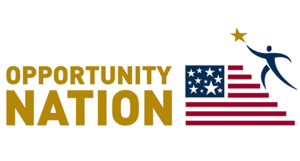The Social Capital Solution
 •
•
From the neighbor who walks your dog when you can’t, to your schoolmates, to your work colleagues, the people we know are our social capital. We make these connections every day in big and small ways, but the act of building bridges and sharing bonds with a variety of people is fraying, and it’s an overlooked piece of the economic equation, according to a new report from the Joint Economic Committee called, “The Things We Do Together: The State of Associational Life in America.” These connections impact opportunity, our workforce and our ability to enact bipartisan public policy.
Civic Connections Impact Opportunity
The report reflects what we found in the 2016 Opportunity Index. Even as traditional economic indicators improved for some, we are less connected to each other. The nation’s most recent Opportunity Score stalled in part due to the civic dimension indicators on volunteerism and group membership. The national average of group membership (percentage of adults 18 and older involved in social, civic, sports and religious groups) fell from 39.8 percent in 2015 to 36.2 percent in 2016. Volunteerism has not improved since the first Opportunity Index was released in 2011.
Soft Skills Wanted
How does connectedness translate to economic security? The impact is both subtle and profound, according to Dr. Robert Putnam, author of “Our Kids” and professor at the John F. Kennedy School of Government at Harvard University, who testified at a hearing for the release of the report and with whom I spoke on a panel at a Children’s Town Hall in Las Vegas last fall before the final 2016 presidential debate. Through his research, Dr. Putnam noted that children in high-income families are able to spend more time with one another, participate in extracurricular activities, can afford to participate in unpaid internship experiences and grow up with more mentors than their peers in low-income families. These experiences give young people important soft skills and social connections that teach them how to work productively with people in a team environment.
Bridging to Build Bipartisanship
While public policy has a role to play in solving this challenge, congressional leaders can start now, among their own relationships. They can start by modeling behavior and work on bridging relationships with each other in public town halls and before the media. The public needs to see policy makers reaching across the aisle, developing genuine, trusted relationships on which common ground and bipartisan policy can be built. Bipartisan public and private conversations can help heal some of the divisions in our country today and make progress on opportunity solutions where we know there is agreement.
We know it’s possible.
Last year, with the Marian B. and Jacob K. Javits Foundation, we awarded the inaugural Javits Prize for Bipartisanship: Lifetime Achievement to Senator Susan Collins and the Javits Prize for Bipartisanship: Emerging Partnership to Senators Tim Scott and Cory Booker at our 2016 National Opportunity Summit. Then in February, we kicked off our Restoring the American Dream series with an event focused on solutions to re-engage one million Opportunity Youth. Senators Booker and Scott reintroduced the LEAP Act to expand apprenticeships. On Tuesday, May 23, we hosted a conversation on Children’s Savings Accounts as an effective method of helping children attend and complete post-secondary education. Senators Chris Coons and Marco Rubio attended, spoke and introduced the American Dream Accounts Act. These congressional leaders’ genuine belief in a shared vision for the nation’s children and a willingness to appear together and promote a common goal is a much needed example for the rest of Congress and around the country.
Let’s find the bridges and bonds we can build in our own ways and be a part of the social capital solution.









